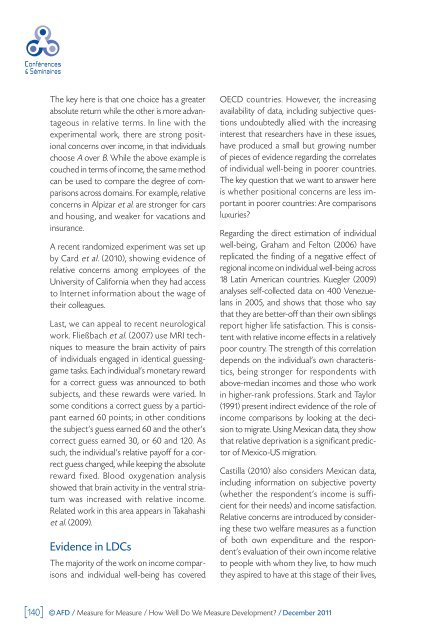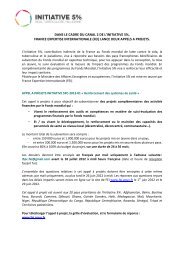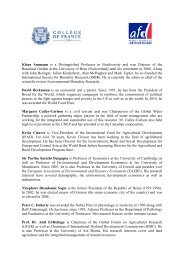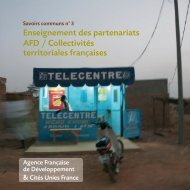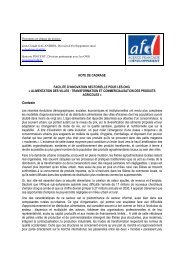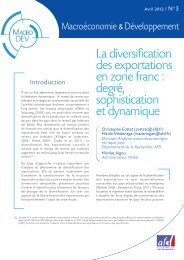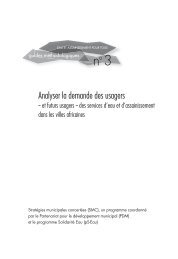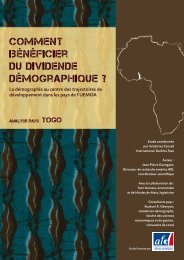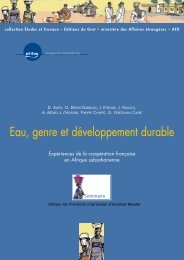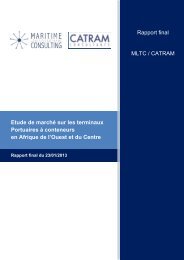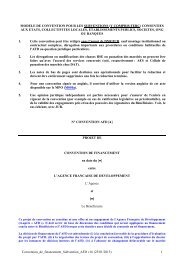Paris School of Economics - L'Agence Française de Développement
Paris School of Economics - L'Agence Française de Développement
Paris School of Economics - L'Agence Française de Développement
You also want an ePaper? Increase the reach of your titles
YUMPU automatically turns print PDFs into web optimized ePapers that Google loves.
The key here is that one choice has a greater<br />
absolute return while the other is more advantageous<br />
in relative terms. In line with the<br />
experimental work, there are strong positional<br />
concerns over income, in that individuals<br />
choose A over B. While the above example is<br />
couched in terms <strong>of</strong> income, the same method<br />
can be used to compare the <strong>de</strong>gree <strong>of</strong> comparisons<br />
across domains. For example, relative<br />
concerns in Alpizar et al. are stronger for cars<br />
and housing, and weaker for vacations and<br />
insurance.<br />
A recent randomized experiment was set up<br />
by Card et al. (2010), showing evi<strong>de</strong>nce <strong>of</strong><br />
relative concerns among employees <strong>of</strong> the<br />
University <strong>of</strong> California when they had access<br />
to Internet information about the wage <strong>of</strong><br />
their colleagues.<br />
Last, we can appeal to recent neurological<br />
work. Fließbach et al. (2007) use MRI techniques<br />
to measure the brain activity <strong>of</strong> pairs<br />
<strong>of</strong> individuals engaged in i<strong>de</strong>ntical guessinggame<br />
tasks. Each individual’s monetary reward<br />
for a correct guess was announced to both<br />
subjects, and these rewards were varied. In<br />
some conditions a correct guess by a participant<br />
earned 60 points; in other conditions<br />
the subject’s guess earned 60 and the other’s<br />
correct guess earned 30, or 60 and 120. As<br />
such, the individual’s relative pay<strong>of</strong>f for a correct<br />
guess changed, while keeping the absolute<br />
reward fixed. Blood oxygenation analysis<br />
showed that brain activity in the ventral striatum<br />
was increased with relative income.<br />
Related work in this area appears in Takahashi<br />
et al. (2009).<br />
Evi<strong>de</strong>nce in LDCs<br />
The majority <strong>of</strong> the work on income comparisons<br />
and individual well-being has covered<br />
OECD countries. However, the increasing<br />
availability <strong>of</strong> data, including subjective questions<br />
undoubtedly allied with the increasing<br />
interest that researchers have in these issues,<br />
have produced a small but growing number<br />
<strong>of</strong> pieces <strong>of</strong> evi<strong>de</strong>nce regarding the correlates<br />
<strong>of</strong> individual well-being in poorer countries.<br />
The key question that we want to answer here<br />
is whether positional concerns are less important<br />
in poorer countries: Are comparisons<br />
luxuries?<br />
Regarding the direct estimation <strong>of</strong> individual<br />
well-being, Graham and Felton (2006) have<br />
replicated the finding <strong>of</strong> a negative effect <strong>of</strong><br />
regional income on individual well-being across<br />
18 Latin American countries. Kuegler (2009)<br />
analyses self-collected data on 400 Venezuelans<br />
in 2005, and shows that those who say<br />
that they are better-<strong>of</strong>f than their own siblings<br />
report higher life satisfaction. This is consistent<br />
with relative income effects in a relatively<br />
poor country. The strength <strong>of</strong> this correlation<br />
<strong>de</strong>pends on the individual’s own characteristics,<br />
being stronger for respon<strong>de</strong>nts with<br />
above-median incomes and those who work<br />
in higher-rank pr<strong>of</strong>essions. Stark and Taylor<br />
(1991) present indirect evi<strong>de</strong>nce <strong>of</strong> the role <strong>of</strong><br />
income comparisons by looking at the <strong>de</strong>cision<br />
to migrate. Using Mexican data, they show<br />
that relative <strong>de</strong>privation is a significant predictor<br />
<strong>of</strong> Mexico-US migration.<br />
Castilla (2010) also consi<strong>de</strong>rs Mexican data,<br />
including information on subjective poverty<br />
(whether the respon<strong>de</strong>nt’s income is sufficient<br />
for their needs) and income satisfaction.<br />
Relative concerns are introduced by consi<strong>de</strong>ring<br />
these two welfare measures as a function<br />
<strong>of</strong> both own expenditure and the respon<strong>de</strong>nt’s<br />
evaluation <strong>of</strong> their own income relative<br />
to people with whom they live, to how much<br />
they aspired to have at this stage <strong>of</strong> their lives,<br />
[ 140]<br />
© AFD / Measure for Measure / How Well Do We Measure Development? / December 2011


